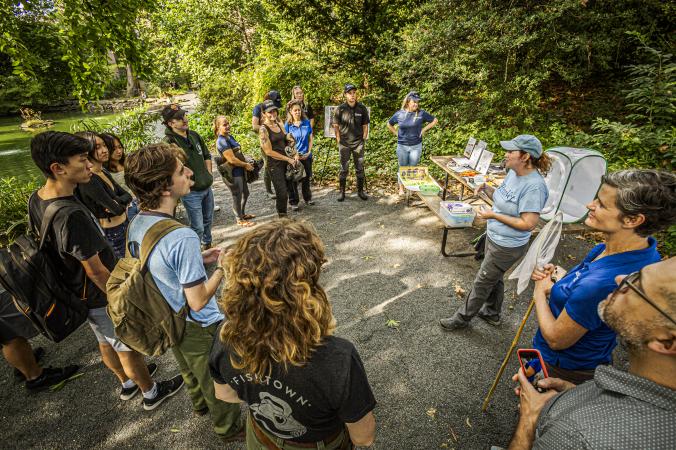The Integrating Sustainability Across the Curriculum (ISAC) Program helps course instructors at Penn introduce environmental sustainability into new and existing courses. The program, run by Penn Climate with support from the Penn Sustainability Office and School of Engineering and Applied Science, provides full funding for graduate or undergraduate summer research assistants, who work directly with faculty and lecturers to update or create new syllabi, lectures, assignments, texts, and/or tests that incorporate environmental themes.
In light of the Environmental Innovations Initiative staff and programming integrating with Penn Climate, Penn Climate will be administering the Integrating Sustainability across the Curriculum Program for Summer 2026.
During the summer, faculty and lecturers selected as part of the program supervise student research and, before the fall semester begins, attend a wrap-up presentation where students present their completed research.
Since 2012, ISAC has supported more than 80 courses in a diverse array of disciplines, including architecture, law, biology, engineering, urban planning, and Germanic languages. Faculty and lecturer participants have reported extremely high-quality work and have been delighted by students' productivity and enthusiasm.

The ISAC program offers support for instructors to incorporate sustainability into a new or existing course by fully funding a paid undergraduate or graduate research assistant for the academic summer term.
Research assistants will be selected and matched with instructors based on experience, knowledge, and interests. Students will work both independently and with faculty for the duration of the program. Each student devotes 15 hours a week to two different faculty or lecturers, for a total of 30 working hours a week. Research assistants’ responsibilities can include updating course material, developing new teaching methods, evaluating current course topics, and/or reviewing new assignments.
The call for proposals from faculty and lecturers for Summer 2026 is now closed.
Students accepted into the ISAC program will serve as Research Fellows for 11 weeks over the summer. Each student will work with two faculty members to integrate sustainability into their courses, which may involve researching material for the courses, developing new assignments, contributing to lectures, and compiling course reading lists.
Penn Climate will help students outline goals for the summer fellowship, and students will also provide periodic progress updates to us. At the end of the program, students will present their work.

Student research assistants accepted into the program each work with two faculty members, 15 hours per week per faculty member (30 total hours per week). Responsibilities may involve researching new material for courses, compiling course reading lists, or developing new assignments or exam questions. Throughout the summer, each research assistant will be expected to:
- Work closely with the assigned faculty on the development of their courses;
- Participate in workshops and sustainability-themed field trips with other students; and
- Present their course development in an event at the end of the summer.
Courses being supported via ISAC for Summer 2026:
- Penn Dental School Curriculum. Please note: Students who select this option will work exclusively on this curriculum, rather than being assigned to two courses. In your cover letter, you may indicate your interest in the Penn Dental School Curriculum only.
- Preferred Qualifications: Background knowledge of the Biological Sciences.
- ITAL0097, Sustainable Italian Foodways: GloCal Experiences in Philadelphia.
- Preferred Qualifications: No knowledge of Italian is required. Interest in or openness to learning about the Italian Slow Food movement, basic research skills, working understanding of sustainability principles, ability to evaluate and summarize sustainability practices, strong written communication skills, ability to communicate complex concepts to peers while drafting short student assignments.
- HSSCXXXX, Environment and Society.
- Preferred Qualifications: Would ideally have experience working with primary documents or local government.
- ENGR5300, Renewable Energy Technologies Lab.
- Preferred Qualifications: Would ideally have some experience in electrochemistry, likely from chemical engineering, chemistry, or materials science.
- CPLN57XX, Issues in Planning and Development in Cities of the Global South.
- Preferred Qualifications: Early PhD or Masters students with knowledge in urbanization, planning, and development in the Global South. Nice to haves: some knowledge of climate resilient infrastructure, the World Bank, an understanding of the differences between unitary and federal systems, and the issues surrounding decentralization.
- XXXX, Climate Communication Capstone.
- Preferred Qualifications: The student will be a junior or senior or graduate student, and have some experience in environmental science, studies,or policy subject areas. any student with communication experience or coursework would be strongly preferred.
- MEAM2470, Mechanical Engineering Laboratory.
- Preferred Qualifications: The ideal student will have experience with heat transfer and fluid mechanics. Rising juniors and seniors in MEAM, particularly in the Energy, Fluids, and Thermal fluids track, or CBE, would be well-suited.
The ISAC program is a key component of Penn’s Climate and Sustainability Action Plan and is designed to support the development of new coursework that addresses critical sustainability issues of the 21st century. ISAC internships are considered part-time jobs (30 hours a week); interns will be paid for 11 weeks, starting May 26, 2026.
Details
- $15-18.00 per hour / 30 hours per week
- Dates: May 26 – August 7 (Academic Summer Term)
- Applications are due Monday, March 2, 2026, by 11:59 pm. Acceptance notifications will be sent out no later than Friday, March 6.
- Preference will be given to work-study eligible applicants
- In your cover letter, please indicate which two classes you would be interested in working on (see list above) and your qualifications that would specifically support those courses.
How to apply
Interested students should send a resume/CV and a cover letter to contact@environment.upenn.edu, using the email subject, “ISAC Application 2026.” The cover letter should include which two classes the student would be interested in working on (see list above) and the qualifications that specifically support those courses. Applications that do not include this information will not be considered.
For more on the ISAC Program
- YouTube - Sustainability Coursework Created by Students at Penn
- Penn Today - “Senior Michael Steele Helps Integrate Sustainability into the Classroom at Penn”
For more on the ISAC Program
- YouTube - Sustainability Coursework Created by Students at Penn
- Penn Today - “Senior Michael Steele Helps Integrate Sustainability into the Classroom at Penn”
Selected course listings from past ISAC programs
ISAC courses in 2025
- EAS: Energy Technology, Sustainability and Policy Grand Challenges in 2030 and beyond
- ENGL3353: Advanced Nonfiction Writing - XFic
- URBS: Urban Schools and Neighborhood Change
- URBS: Urban Climate Policy and Action
- Penn Master of Public Health Curriculum
- ENGR: Renewable Energies Technologies Lab
ISAC courses in 2024
- ARCH3010: Design I
- COMM3450: Adolescence and Media
- DSGN 3250: MATTERS: Connecting Arts + Design to Materials, and Materials to Labor + Land
- INTS 5120: The City Paradox: Design, Innovation, and Leadership
- LALS 3020: Diplomacy in the Americas - the Penn Model OAS Program
- VSCN 6570: One Health and Global Food Security